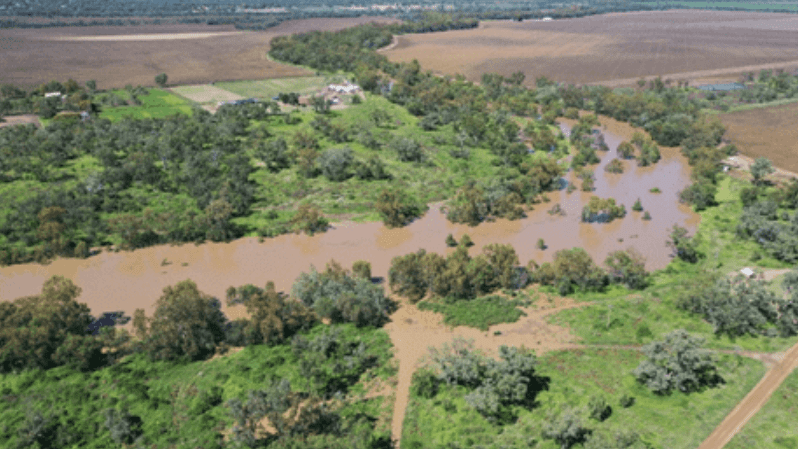
An aerial photo of the Gwydir River near Yarrraman taken in November 2021. Photo: Sascha Estens, Rabbithop Films
WITH the New South Wales Upper House voting down floodplain-harvesting regulations yesterday, farming bodies are unsure what the decision will mean for irrigators in the impacted regions of the Border Rivers and Gwydir Valley.
The determination, which came into effect on February 21, was knocked back by a vote of 18 to 15 after a disallowance motion was introduced in the NSW Upper House.
It has caused confusion for irrigators in both valleys, who had already received letters indicating what allowance they could expect as part of a floodplain-harvesting license.
Three other regions, the Namoi, Macquarie and Barwon-Darling, are yet to see a determination relating to their water use.

NSW MP Justin Field.
All agree regulation is needed
The NSW floodplain-harvesting policy sought to regulate the practice of floodplain harvesting, used mostly by cotton growers, by introducing water licences. and imposing mandatory metering requirements.
Most stakeholders, even the political representatives who came out against the legislation, agree that a policy is needed to regulate the practice.
However, groups disagree on several key issues: how water volumes are measured and allocated, and the impact uncontrolled and allegedly exorbitant floodplain harvesting will have on the environment and downstream communities.
NSW Independent MP Justin Field put forward the motion to disallow policy.
Mr Field said he did not see an issue “in principle” with regulating floodplain harvesting, but rules in the current regulations were insufficient to address the concerns of community members.
“Currently, those rules are inadequate, inequitable, unsustainable and unacceptable to many,” Mr Field said.
“If the government planned licensing goes ahead without changes to those management rules, billions of dollars’ worth of water entitlements will be gifted…to fewer than 1000 mostly large corporate irrigators in the northern part of the state.”
Irrigators frustrated
NSW Irrigators’ Council chief executive officer Claire Miller said irrigators were calling out for floodplain-harvesting regulation, even though this may mean they have reduced access to water.
“All stakeholders agree floodplain harvesting should be regulated, licensed and managed,” Ms Miller said.
She said the decision on Thursday pushed the entire process back and made the situation more difficult for irrigators.
“It is frustrating for everyone involved,” Ms Miller said.
“No one is winning out of this and, if anything, this latest disallowance vote is actually a vote against the environment and in favour of irrigators, because it means that irrigators can keep on taking whatever floodwaters they want for free.”
She said the industry did have to weigh up the anticipated benefits of a floodplain-harvesting policy on the environment against the economic costs which an analysis found would be a 14-per-cent loss to farmers’ bottom lines.
Environmental concerns
Conservation groups and associations representing southern basin communities warned that the policy would not deal with their environmental concerns, and that a new policy should be drafted.
NSW Nature Conservation Council chief executive Chris Gambian said in a statement that the outcome was “the best decision possible for river health, First Nations peoples and downstream communities”.
“This decision provides an opportunity for the government to go back and enter good-faith negotiations with all the key stakeholders to get the balance right on this critical piece of public policy,” Mr Gambian said.
“We have to strike the right balance to ensure a viable agricultural sector all along the river system while keeping the river flowing and connected end to end.
“There’s no agriculture on a dead river system.
“We are ready to sit down in good faith and find a system that can work.”
Public policy think tank, Australian Institute, also welcomed the Upper House decision.
Institute research director Rod Campbell said reducing floodplain harvesting would be a win for all Murray-Darling Basin communities.

NSW Irrigators’ Council CEO Claire Miller
“Australia Institute research shows that reducing floodplain harvesting for cotton exports is likely to increase employment across the Murray-Darling Basin, as more water can be used for food production in regions where food processing is a big employer,” Mr Campbell said.
“This water could be worth $2 billion, and the NSW Government was looking to just give it away.”
Government continues push for regulation
NSW Minister for Regional Transport and Roads Sam Farraway argued for the policy to continue.
He said the NSW Government will continue pushing to have a comprehensive floodplain harvesting policy in place.
“Bringing floodplain harvesting into the licensing framework so that it can be managed within established legal limits for extraction has been the objective of successive New South Wales governments since 2000,” Mr Farraway said.
“The NSW Government remains committed to the task of regulating floodplain harvesting within the legal limits set out in NSW water sharing plans and the basin plan.
“This is important so that we can meet our legislative obligations, improve environmental and connectivity outcomes and provide clarity for all water users and the regulator.”
With no relevant regulation in place, Ms Miller said there is nothing to govern the monitoring of floodplain harvesting in the two affecting valleys and the three others will continue business-as-usual.
“What the disallowance means is that there is no regulation to force people to meter what they take,” she said.
“NRAR (Department of Natural Resource Access Regulator) can’t force compliance because there is no regulation to force them to meter it.
“In the remaining three valleys, the status quo continues.”
Ms Miller said the path forward is not clear, but in the least it would require cooperation between all parties.
“We want the parties to get together and find a pathway through this,” she said.
“We are appealing to all parties, in good faith, to resolve it.”
Floodplain harvesting in NSW is estimated to account for 3 per cent of total annual inflows into the northern basin.
Grain Central: Get our free news straight to your inbox – Click here

HAVE YOUR SAY